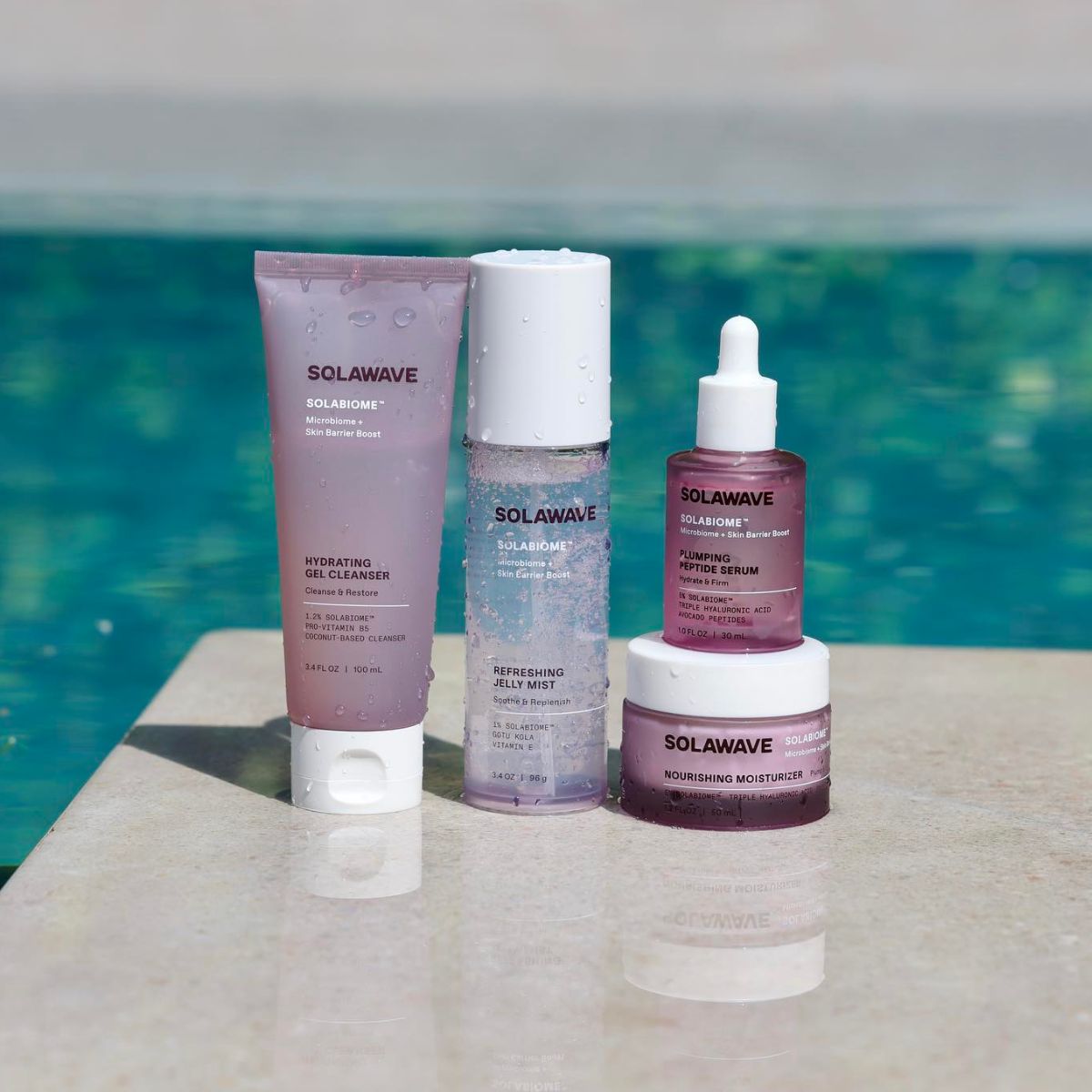

How To Use Activating Serums to Maximize Their Benefits
Activating serums is a revolutionary step in skincare, acting as powerful allies in your beauty routine. Unlike traditional skin care products, these serums are designed to “activate” or boost the skin’s natural functions. This could mean enhancing cell regeneration, increasing hydration, or fighting free radicals. Activating serum is a term that involves a variety of specialized serums, each targeting specific skin concerns. Their concentrated formulas mean a little goes a long way, making them a cost-effective solution for long-term skincare.
Types of Activating Serums
Light Therapy Boosting Serums
Elevate your Red Light Therapy sessions with the LightBoost™ Red Light Therapy Hyaluronic Serum, designed to pair seamlessly with your Solawave 4-in-1 Skincare Wand. This silky, lightweight serum cushions your skin for a smoother glide and supports healthier-looking skin with deep hydration from hyaluronic acid, brightening Nonapeptide-1, and a mineral complex of magnesium, zinc, and copper.
Apply a generous layer to clean, dry skin before using your wand, and reapply as needed. The formula absorbs easily, is gentle and fragrance-free, and fits effortlessly into your daily routine. Vegan, cruelty-free, and free from parabens and artificial colorants, this serum helps you get the most out of every Light Therapy session.
Hydrating Serums
Hydrating serums are a blessing for dry and dehydrated skin, and the star ingredient in these is often hyaluronic acid serum. This powerful component can hold up to 1000 times its weight in water, making it an exceptional hydrator for the skin. By attracting moisture from the environment and locking it into the skin, hyaluronic acid serums help to plump up the skin, reducing the appearance of fine lines and making the skin look more radiant and youthful.
Moisturizing Serums
While hydrating serums mainly focus on water retention, moisturizing serums are more about nourishing and protecting the skin's lipid barrier. They often contain ingredients like ceramides, fatty acids, and oils that help to repair and reinforce the skin’s natural barrier. This type of serum is particularly beneficial for those with dry or mature skin, as it helps to restore the skin's elasticity and prevent moisture loss, resulting in smoother, softer skin.
Antioxidant Serums
Antioxidant serums are crucial in protecting the skin from environmental stressors like pollution and UV rays. These serums are typically rich in vitamins C and E, among other antioxidants, which help to neutralize free radicals that can cause premature aging and damage to the skin. Regular use of an antioxidant serum can improve skin resilience, reduce signs of aging, and give the skin a more vibrant, healthier appearance.
Device Serums
Innovative skincare technologies have led to the development of light therapy serum and device serum options. These serums are designed to be used in conjunction with specific skincare tools, like LED light masks or microcurrent devices, to enhance the efficacy of the treatment. Light therapy serums often contain ingredients that are activated or better absorbed under certain light wavelengths, offering targeted treatment and enhanced results in skin rejuvenation and healing.
Pro Tips for Using Activating Serums
To get the most out of your activating serums—especially those designed to pair with devices like Red Light Therapy wands—keep these tips in mind:
-
Apply to Clean, Dry Skin: Always start with freshly cleansed skin. This helps your serum absorb better and ensures you’re not trapping dirt or oil under the product.
-
Use a Generous Layer: Don’t be shy with your serum. A generous application creates a smooth surface for your device to glide over, making your treatment more comfortable and effective.
-
Reapply as Needed: If you’re treating multiple areas or notice the serum drying out during your session, add a bit more. Keeping the skin well-cushioned supports both comfort and results.
-
No Need to Rinse: Activating serums are designed to absorb fully into your skin. Let the serum sink in after your treatment for lasting hydration and radiance.
-
Pair With the Right Device: Activating serums are formulated to work hand-in-hand with your Light Therapy device. Using them together helps you get the most visible benefit from each session.
-
Layer Thoughtfully: After your Light Therapy treatment, you can follow up with your favorite moisturizer or sunscreen. Activating serums are lightweight and layer easily with other products.
-
Stay Consistent: For the best results, use your activating serum regularly as part of your routine. Consistency helps you see and maintain the visible benefits over time.
-
Store Properly: Keep your serum in a cool, dry place and make sure the cap is tightly closed to preserve its potency
Targeted Treatment Serums
If you’re looking to address visible signs of skin aging, serums for wrinkles are thoughtfully formulated to support smoother, firmer-looking skin. These serums often feature ingredients like retinoids, peptides, and antioxidants, which help support healthy collagen production, encourage skin renewal, and defend against environmental stressors. With regular use, you may notice a softer look to lines and wrinkles, and your skin can appear more resilient and refreshed.
Serums for fine lines are designed to target the earliest signs of skin aging. These lightweight formulas often include vitamin C, hyaluronic acid, and niacinamide to deliver hydration and help maintain your skin’s natural elasticity. By keeping your skin well-moisturized and supported, these serums can help smooth the look of fine lines and keep your complexion looking radiant.
For uneven skin tone or dark spots, serums for hyperpigmentation are a smart choice. Ingredients like vitamin C, kojic acid, and licorice root extract are known to help visibly brighten and even out skin tone by addressing the appearance of dark spots over time. With consistent use, your complexion can look clearer and more luminous.
There are also specialty serums tailored for unique needs, such as skin that’s prone to pimples or sensitivity. These formulas are crafted with gentle, targeted ingredients—like salicylic acid for clearer-looking skin or soothing botanicals such as aloe vera and chamomile for comfort. Whatever your skin concern, there’s a targeted serum to help you feel confident in your routine.
Application Techniques for Maximum Benefit
How you apply your serums can make a real difference in your results. Begin with a clean, slightly damp face—damp skin helps your serum absorb more effectively. Dispense a few drops onto your fingertips and gently press the serum into your face and neck, avoiding any harsh rubbing. Let it fully absorb for a minute or two before moving on to the next step in your routine.
Layering your skincare in the right order also matters. Always apply serums before creams or oils, following the general rule of moving from the thinnest to the thickest texture. This helps lock in the benefits of your serum and adds extra hydration and protection.
Different types of serums may need a slightly different approach:
-
LightBoost Serums: Designed to be used with your Red Light Therapy device, LightBoost serums should be applied generously to clean, dry skin before your session. These serums cushion the skin for a smoother glide and help support the visible benefits of Light Therapy, such as hydration, radiance, and a smoother look.
-
Hydrating Serums: For best results, apply these to slightly damp skin. This helps the hydrating ingredients, like hyaluronic acid, draw in and hold onto moisture, leaving your skin plump and supple. Give the serum a few minutes to absorb before layering on your moisturizer.
-
Antioxidant Serums: Use antioxidant serums, such as those with Vitamin C or E, in the morning under sunscreen. This helps shield your skin from daily environmental stressors and supports a brighter, more even tone.
-
Retinol Serums: Retinol is best used at night, as it can make your skin more sensitive to sunlight. Apply your retinol serum after cleansing, then follow with a moisturizer to help minimize dryness or irritation.
-
Exfoliating Serums: Serums with exfoliating acids like AHAs or BHAs should be used every other night to avoid over-exfoliation. This routine helps smooth your skin and keeps it receptive to other products, without causing irritation.
-
Brightening Serums: For concerns like uneven skin tone or dark spots, apply brightening serums both morning and evening. Ingredients like Vitamin C, niacinamide, and licorice root extract can help fade discoloration and promote a more radiant complexion.
Consistency is key—using your serums regularly and in the right order helps you get the most out of your routine. Pairing the right application techniques with healthy lifestyle habits can help you see the best results for your skin.
Choosing the Right Serum
Finding the right serum can make a big difference in how your skin looks and feels. Start by considering your skin type and your main concerns—whether that’s dryness, excess oil, sensitivity, or visible signs of skin aging.
If your skin tends to be oily, look for lightweight, water-based serums that help balance oil without clogging pores. Ingredients like niacinamide or salicylic acid can help keep shine in check and support clearer-looking skin. For dry skin, reach for serums rich in hydrating ingredients such as hyaluronic acid or glycerin, which help draw in and lock in moisture for a plumper, more comfortable feel. Combination skin often benefits from balancing serums that hydrate dry areas while controlling shine in oilier zones.
If you have sensitive skin, choosing the right serum is all about gentle care. Look for products labeled as suitable for sensitive skin, as these are often formulated to minimize the risk of irritation. Serums with simple ingredient lists and soothing ingredients like hyaluronic acid, niacinamide, or squalane can help nourish and comfort your skin. Avoid serums with alcohol, synthetic fragrances, or essential oils, as these can trigger redness or discomfort. It’s always smart to patch test a new serum on a small area before using it on your whole face—just to be sure your skin responds well.
For those focused on visible signs of skin aging, serums with peptides, antioxidants, or gentle retinoids can help support firmer, smoother-looking skin. If uneven skin tone or dark spots are your main concern, look for serums with vitamin C, licorice root extract, or niacinamide to help brighten and even out your complexion.
You don’t have to spend a fortune to find an effective serum. Focus on the ingredient list and the concentration of the actives that matter most for your skin, rather than the brand name or price tag. Many affordable serums offer the same benefits as pricier options, so you can build a routine that fits your needs and your budget.





















